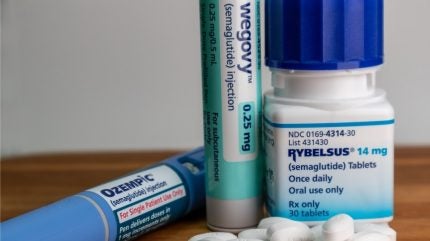
Anti-obesity drugs will be the most impactful trend of 2024, followed by personalised and precision medicine, immuno-oncology (IO) drug development, real-world evidence (RWE) and cell and gene therapies (CGTs).
This is according to GlobalData’s most recent biopharmaceutical update: The State of the Biopharmaceutical Industry 2024 Edition (Mid-Year Update).
GlobalData is the parent company of Pharmaceutical Technology.
The report notes that the obesity drug market has seen a significant uptick in popularity since the emergence of glucagon-like peptide-1 receptor agonists (GLP-1 RAs) as a specific drug class. GlobalData anticipates that by 2033, the GLP-1 RA market will reach sales of $125.3bn, and notes that 90% of these sales will be from obesity drugs.
The popularity of the GLP-1 RAs is encouraging R&D investment and is driving growth in the metabolic disorder therapy landscape – the fastest growing of any therapy area. Obesity drugs such as Novo Nordisk’s Ozempic (semaglutide), Wegovy (semaglutide), and Eli Lilly’s Mounjaro (tirzepatide) are behind the rapid growth, offering an improved efficacy and safety profile than other anti-obesity medications (such as appetite suppressants and combination drugs).
The growing market offers opportunity, and frontrunners Novo Nordisk and Eli Lilly are already struggling to meet demand. GlobalData notes that the obesity pandemic is set to continue, and reports that “the obesity population in the seven major pharmaceutical markets (US, France, Germany, Italy, Spain, UK, and Japan) will grow at an annual growth rate (AGR) of 0.57% in the next ten years, reaching over 161.5 million cases in 2033”.
Access the most comprehensive Company Profiles on the market, powered by GlobalData. Save hours of research. Gain competitive edge.

Your download email will arrive shortly
We are confident about the unique quality of our Company Profiles. However, we want you to make the most beneficial decision for your business, so we offer a free sample that you can download by submitting the below form
By GlobalData
The survey behind the report was conducted between 5 April and 10 May 2024, with 124 participants made up of GlobalData Pharma clients and prospects. It asked participants to score trends on a scale of 1 – 5 according to how ‘impactful’ they would be in biopharmaceuticals in 2024. Anti-obesity drugs scored highest, with an average of 4.0, whilst personalised and precision medicine, IO drug development, RWE and CGTs all scored 3.8.
Anti-obesity drugs were identified as the most impactful trend by 18% of respondents, RWE by 17% CGT and personalised medicine by 8%, and IO by 6%.
The report notes that “CGTs, personalised/precision medicine, and IO drug development are closely related trends that have already begun to reshape disease treatment paradigms and the provision of healthcare. Their influence will continue to grow as additional IO drugs and CGTs reach the market, and the emphasis on tailored disease prevention and treatment will continue to be the driver and enabler for value-based healthcare”.
Moreover, the report anticipates that RWE will become increasingly important for both healthcare systems and pharmaceutical companies, backed by the support of the US Food and Drug Administration (FDA), Medicines and Healthcare Products Regulatory Agency (MHRA), and EMA.
It states: “RWE is gaining traction as a valuable and necessary source of information to support the decision-making processes in healthcare settings. In the pharmaceutical sector, RWE is expected to play a major role in drug development and the approval of new medicines. With the increasing need to move towards value-based healthcare, more inclusive and representative research, and more personalised patient treatments, RWE will help fuel the transition from volume-based care.”
RWE offers evidence-based decision-making and an increased understanding of drug performance, and its value is becoming increasingly recognised in clinical trials. GlobalData’s Clinical Trials database reveals a rise in RWE trials between 2012 and 2022, and the report comments on its potential to improve efficiency in clinical planning, participant recruitment, trial design, and post-marketing surveillance.
Considering the general challenges facing the biopharmaceuticals sector, the report concludes that “the pharmaceutical industry often faces regulatory pressure to lower drug prices, as well as implement stricter controls on clinical trials and production standards. However, too much regulation may pose a risk of hindering growth and innovation, especially when the industry must function in an uncertain and challenging economic and geopolitical environment”.

Sign up for our daily news round-up!
Give your business an edge with our leading industry insights.
